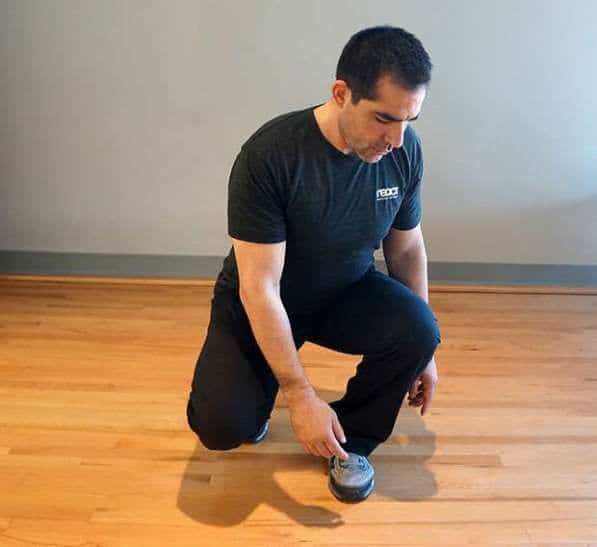Symptoms & Signs Of Crepitus
Crepitus, or joint sounds and bone cracking can be a normal part of movement. Many people experience popping joints, especially as they get older. You may notice:
- Sounds of knee popping or knee cracking when you bend your knee
- Popping or cracking when you bend your elbow
- Crunching sounds in your knee when you go up or down stairs or kneel
- Crackling or grinding sounds or a crunching sensation when you move your shoulder
- Occasional or continual swelling around the joint
Knee Clicking With No Pain
Your knee clicking when walking, squatting, or straightening the leg could simply be due to gas bubbles. As the pressure in your knee joint changes, small bubbles of gas build up in the region. These bubbles burst with certain movements, making the popping sound.
Noisy knees can also result from the stretching of a tendon or ligament over a bony lump. You may hear a clicking noise when the tissue snaps back into place.
Another cause of pain-free clicking may be scar tissue moving over the bones.
You May Like: How To Tell If You Fractured Your Knee
Differentiation Of Noise Characteristics According To Sound Nature
The sounds around the knee have been described using various terms, including popping, snapping, catching, clicking, crunching, cracking, crackling, creaking, grinding, grating, and clunking. These terms can be used to differentiate noises in terms of frequency, duration, and loudness, but it is not easy to describe the nature of the sounds precisely. The term popping is used to describe a sudden sharp explosion and well perceived sound in an injury situation popping can occur at the root tear of the degenerative medial meniscus and at the detachment of the cruciate or collateral ligaments of the knee.7) The term clunking is used to describe a loud, singular noise occurring due to release against resistance patellofemoral clunking after TKA is caused by entrapment of fibrotic nodule at the junction of the superior pole of the patella and the distal quadriceps tendon within the superior aspect of the intercondylar box of the femoral component during knee flexion to extension.8) The term clicking is used to describe a tiny, singular noise that occurs during one cycle of knee extension and flexion it is commonly associated with meniscal tears.1) The terms grinding and grating are used to describe a continuous scratching noise grinding or grating is common in degenerative OA and patellofemoral pain syndrome.2,9) However, joint sounds are commonly labeled as crepitus by doctors because this term is familiar due to the use for describing lung sounds.
Don’t Miss: What Can I Do To Ease Knee Pain
Treatment For Knee Pain
The first step in treating knee pain is finding the underlying cause. A thorough examination at one of our ProBack Clinics will help identify exactly whats causing the problem. After a diagnosis is made, treatmentcan be undergone to relieve the pain, correct the problem or prevent it from recurring in the future.
How Can I Repair My Knee Cartilage Naturally

Legumes are high in protein, which is why they help replenish the collagen our body needs to rebuild the cartilage in our knees. When trying to build a strong and healthy body, they have essential amino acids and lysines, both of which are essential. In addition to their protein content, beans are rich in fiber, vitamins, minerals, and phytochemicals.
Beans are also a good source of fiber because they have a high amount of insoluble fiber. This means that when you eat beans, you are not absorbing all of the fiber that is in them.
Instead, some of it is absorbed into your bloodstream, where it can be used by your body for energy, or it may be stored as glycogen in your muscles and liver.
The fiber in beans also helps to keep your blood sugar levels in check, so you dont have to eat as much sugar as you would if you were on a low-carb diet.
Don’t Miss: How To Remove Baker’s Cyst From Knee
What Causes Crackly Knees
There are lots of potential causes for that cracking or popping sound in a knee, said Daniel Probst, M.D., a sports medicine physician at Summit Orthopedics. Almost all knees tend to make noise sometimes.
So, how do you tell if your crackly knee is a sign of something more serious? There are two big questions to ask if youre wondering whether your noisy knees need a doctors attention.
Damage To The Knee Joint
Sometimes, however, there is an underlying problem, for example, tissue damage or lesions. In this case, treatment may be necessary.
If there is pain as the knee snaps or catches, it can be because scar tissue, a meniscus tear, or a tendon is moving over a protruding bone within the knee joint.
Pain or swelling can be a sign of a more serious problem, such as patellofemoral pain syndrome , a tear in the cartilage or other soft tissue, or osteoarthritis .
These issues may need medical attention. Lets look at them now in more detail.
Recommended Reading: What Kind Of Doctor Do You See For Knee Pain
Knee Noises When Bending
If the noises dont come along with pain, there usually isnt a reason to worry, says a doctor from UCLAs Sports Medicine Program. The popping or cracking often happens when squatting or moving. Its a similar noise as cracking knuckles and mostly happens with rapid movements.That movement is what causes the gas bubbles to burst, making the noise. If a tendon or ligament flicks across the bone, it can also cause a popping sound.
Crepitus Following Surgery Or Trauma
published in Clinics in Orthopedic Surgery shows that up to 18 percent of people who have a total knee arthroplasty , or knee replacement, will experience crepitus. This may due to the design and fit of the new knee.
This type of crepitus usually resolves without intervention.
However, if problems persist, a doctor may recommend debridement, a minor surgical procedure to remove debris from around the joint.
Another reason for crepitus after surgery is arthofibrosis, or the development of scar tissue. This can lead to pain and stiffness in the joint. It can also happen after a traumatic injury.
If the person experiences pain and stiffness after an injury or surgery, they should see a doctor. The doctor may recommend monitoring the knee, and it may need treatment.
Often, however, crepitus that follows an injury or surgery is not serious. Doctors , for some people, the crepitus may have been there before, but an increased awareness how the joint is reacting makes it more noticeable now.
Often, say the researchers, reassurance and rehabilitation are enough.
Treatment may not be necessary. If it is, the options will depend on the cause, as outlined above.
If crepitus occurs with exercise, the person should not stop exercising but modify the exercise.
Precautionary measures include:
When exercising, people should always listen to their body. If there is pain, they should stop. Always exercise in moderation and stretch before exercising.
Other ways to protect the knees include:
Recommended Reading: How To Combat Arthritis In The Knees
What Causes A Noisy Knee
The most common noise from the knee joint is called crepitus. That’s the rough grinding you may both feel and hear. If you place the palm of your hand on the kneecap and bend your knee back and forth, it may feel like sandpaper in your knee.
Crepitus can happen when rough cartilage surfaces grind over each other. While osteoarthritis is developing, bone spurs will sometimes make the grinding worse. These are small projections of abnormally formed bone.
Other knee sounds include popping and snapping. These sounds are often much louder than crepitus but occur less often. They may happen when your knee is in a certain position or when you move it a certain way. Not all motion will cause these kinds of sounds.
Normal pops and snaps can occur when tendons snap over the bone surrounding the joint. They may also be a sign of cartilage damage inside the joint. If the sound is isolated, it’s probably not a cause for concern. Doctors typically worry when there is significant pain, swelling, or other symptoms.
How Do You Treat Knee Crepitus
Rest, ice, compression, and elevation are the first lines of treatment for this condition. Physical therapyexercises can be used to relieve it. If these dont help, it may be necessary to have surgery. They may help to realign part of the spine, but they are not a cure.
If the condition is not treated, it can lead to paralysis and even death. It is important to recognize the signs and symptoms of spinal stenosis and treat them as soon as possible.
Don’t Miss: What Can I Do For Fluid On My Knee
Why Is My Knee Crunching When I Walk Up Stairs
The crunching you hear likely is due to the cartilage in your knee becoming rough, so the bones cannot slide as easily in the joint as they normally do. When the knee is bent, knee crepitus can happen, such as when you are squatting, going up or down stairs, or bending over to pick something up.
Knee pain can be caused by a variety of things, including arthritis, osteoarthritis, meniscal tears, tendinitis, inflammation of the ligaments and tendons, and other conditions. The most common cause of knee pain is a tear of your meniscus, which is the thin membrane that covers the end of each knee joint. This tear can occur at any age, but tends to be more common in older people.
If you have a knee injury, its important to see your doctor as soon as possible.
Why Is There A Crunching Sound In My Knee

Do you hear or feel a crunching sensation in your knee when walking, running or jumping? An occasional crack of the knee might not be much to worry about, similar to popping the knuckles in your fingers. However, a constant crunching sound in your knee can be understandably concerning.
You might hear crunching in your knee for several reasons, but if there is no pain, swelling or other symptoms, its likely due to a mild condition known as crepitus.
Recommended Reading: How Long Do Gel Shots In The Knee Last
Why Does My Knee Click And Hurt When I Straighten It
When this type of popping occurs, it is usually a sign of a torn cartilage joint or a loose piece of cartilage. The tissues within the knee act as cushions and joint protection. As the knee moves back and forth, it is possible that torn meniscus or loose cartilage will form in the knee. As a result, you will feel a popping sensation.
Torn Meniscus: Why You Should See A Docto
It is important to consult a doctor if you suspect you have a torn kneecap. The condition of a torn anterior kneecap can be disastrous if not treated properly, and it can lead to long-term problems. If you have a tear in the knee, rest it and avoid strenuous activity as much as possible. If you have a torn meniscus and can walk without assistance, you may need to wear a brace or crutches. If you have a torn knee joint and cannot walk, you may need surgery.
A Look At The Knee Joint
The knee works like a large hinge. It consists of bones, cartilage, the synovium, and ligaments.
Bones: The knee joins the thighbone to the long bone of the lower leg . The fibula, a bone in the lower leg, is also connected to the joint. The kneecap is the small, convex bone that sits at the front of the knee, shielding the joint.
Cartilage: Two thick pads of cartilage called the menisci cushion the tibia and femur, and reduce friction where they meet.
Synovium: A specialized connective tissue that lines joints and tendon sheaths. Synovial fluid serves to lubricate the joints.
Ligaments: Four ligaments tough, flexible bands that stretch across the uneven surface of the joints connect the bones.
Crepitus happens for various reasons, apart from osteoarthritis. Here are some of them:
Recommended Reading: Is Walking Good For Bone On Bone Knees
Why Is My Knee Clicking And Painful
Osteoarthritis is a condition in which the smooth cartilage beneath the skin wears down, causing friction between the bones and making clicking or popping painful. Patellofemoral pain syndrome is a common cause.
You might hear clicking noises or popping noises. There could be air bubbles in the synovial fluid. The knee may experience pain if the tendons or ligaments are tight. Stretches and exercises can help relieve the pain and help relax the muscles. Arthritis, also known as joint inflammation, is a common term. If you move your knee or make clicking sounds or feel a grinding sensation, you may have arthritis. Dr. Paul Jacob performs more than 5000 robotic joint replacement surgeries each year.
Differentiation Of Noise Characteristics According To Onset
The precise onset of physiological noise is commonly unknown by patients. On the contrary, the onset of pathological noise is relatively clear compared to physiological noise. The onset of pathological noise can be divided into acute and chronic. Acute onset of noise accompanied by pain may be caused by meniscal or ligament injury.7,10) Chronic pathological noise can occur gradually it may occur sporadically or frequently, depending on the cause. Recurrent and chronic noise may be caused by old meniscal tears, cartilage injury, OA, patellofemoral instability, or patellofemoral pain syndrome.6,11,12,13)
Read Also: How To Do Stairs After Knee Replacement
When Is A Crunching Sound In The Knee Serious
If youre experiencing crunching in the knee along with any of the following symptoms, you should visit a health care professional immediately for an examination and treatment:
- Difficulty walking, running, jumping or standing.
- Crunching develops after a traumatic impact, such as a fall or an automobile accident.
Management Of Noise Around The Knee
Again, it is important to differentiate between physiological and pathological noises. Physiological noise in the knee is common, but usually painless and harmless. If there is no pathological condition, there is no need to be concerned about the noise. It is sufficient to explain the cause of the noise to patients and reassure them. Various exercises for stretching and strengthening the musculotendinous structures may be beneficial for especially ligament snapping. Hip flexor, iliotibial band, and calf muscle stretching are common stretching exercises, while side steps performed with a resistance band, inner thigh squats, and vastus medialis obliquus activation are popular strengthening exercises.24,26)
Read Also: What Causes Knee And Leg Pain
Treatment For Knee Crepitus
Dr. Steretts goal is to treat your painful knee grinding so that you can get back to doing the activities you love. After a thorough evaluation, which will include a physical exam and imaging tests, Dr. Sterett will diagnose the cause behind your knee symptoms and recommend a treatment plan thats right for your lifestyle.
Conservative treatment for crepitus can include all or some of the following:
Knee Popping: Causes Concerns And Treatments

Have you noticed that your joints are making snap, crackle, and pop sounds? Breakfast cereals aside, noisy knees are not atypical. They affect everyone, from those who play sports to those who are getting up in age. It usually isn’t a cause for concern that is unless you experience pain with those pops. If so, it’s time to find out what’s going on and what you can do to prevent further injuries.
There are three types of sounds that help determine what’s causing your knee pain. They are:
Mechanical popping is usually caused by a torn meniscus or loose cartilage. Commonly a sports injury, a torn meniscus occurs by forceful twisting or hyper-flexing of the knee joint. In addition to popping sounds, symptoms include pain, swelling, stiffness, and difficulty extending the knee. The pain may come and go for years without proper diagnosis and treatment. Loose cartilage causes similar sounds. It occurs when the underside of your kneecap unevenly rubs on the front of your thigh bone. It wears down the cartilage over time and results in a popping sound. Pain from cartilage wear is often felt from climbing stairs, squatting, and getting up from prolonged sitting.
Treatments for knee popping
Handpicked Resources for You
Don’t Miss: Why Would The Back Of My Knee Hurt
Causes Of Crepitus Or Joint Sounds
Often, crepitus is harmless. It happens when air seeps into the soft tissues around the joint . When you bend the joint, the air bubbles burst, and you hear a bone cracking sound.
While most crepitus is harmless, some forms of crepitus signal a problem. If the popping or crunching sound comes with pain, you should see a doctor to evaluate the cause.
Causes of painful joint popping may include:
- Osteoarthritis: Arthritis is a condition in which cartilage begins to rub away, leaving bones unprotected and creating inflammation. When bones rub and grind, it causes pain and stiffness that usually gets worse with activity. Read more about arthritis.
- Patellofemoral pain syndrome : Also known as runners knee, PFS causes crepitus along with pain behind the kneecap . It can happen when you suddenly increase your activity level and is often caused by running, squatting or jumping. PFS is more common in women than in men. Learn more about knee pain.
- Torn cartilage: A cartilage tear can happen because of a sports injury, a fall or an accident. Cartilage damage is another possible cause of painful crepitus. Find out more about cartilage damage.